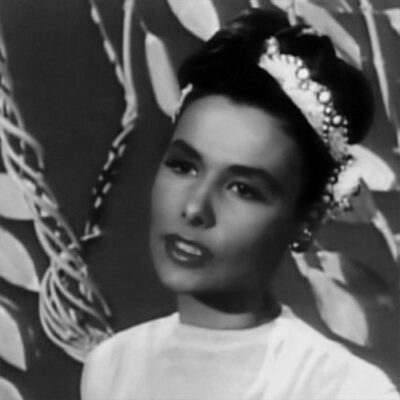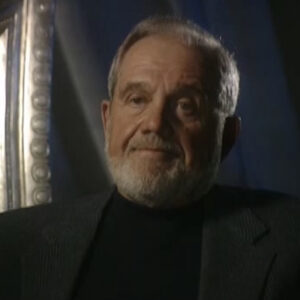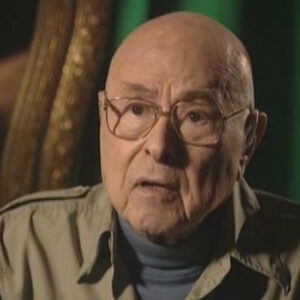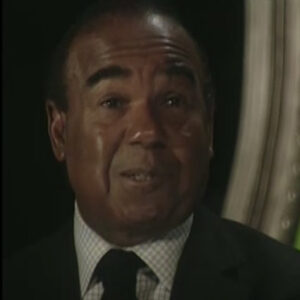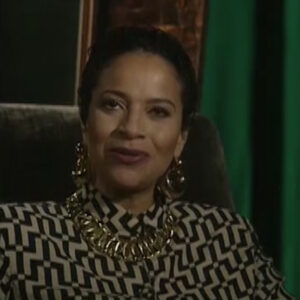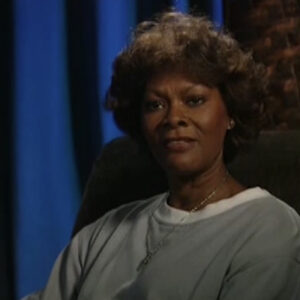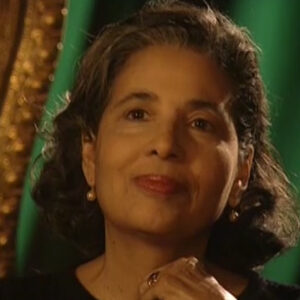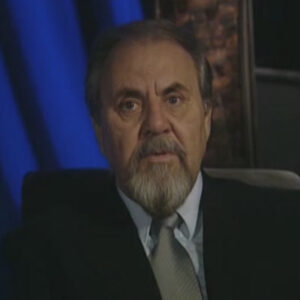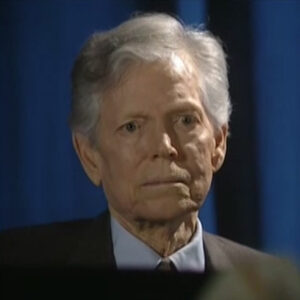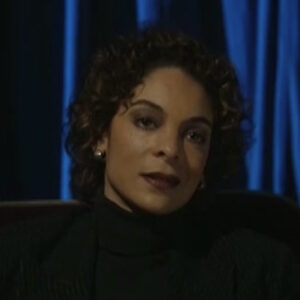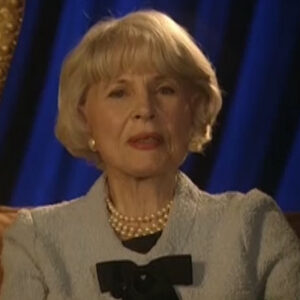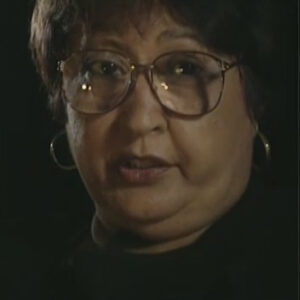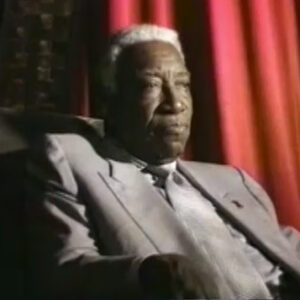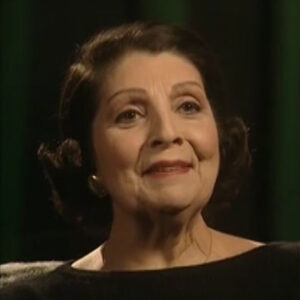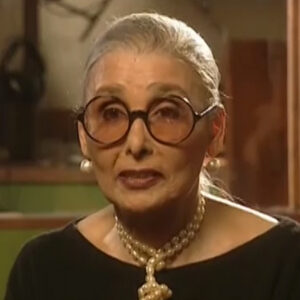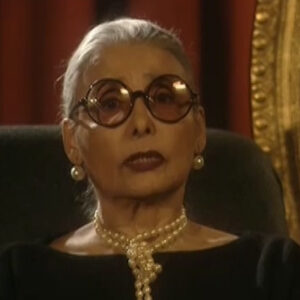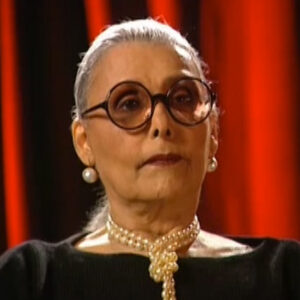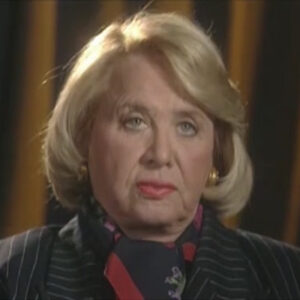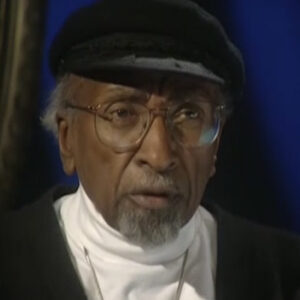Speaker What was the feeling among the cast when they found that, you know, war was coming? Well, first of all, it started with the idea of Lena Horne. And when the cast was gathered, everybody wanted to be part of this musical called Jamaica because everyone wanted to work with Lena Horne, this extraordinary beauty movie star singer lady. And so the excitement was extraordinary. People fought to go to auditions and went back and again. And we had the most extraordinary chorus line. Arthur Mitchell was in the chorus. Claude Thompson, who was the choreographer, Louis Johnson. I think Alvin was with us, too. And it was everyone wanted to be part of this production. Jack Cole was the choreographer, and Ricardo Montalban came from Hollywood to work with Lena Horne. And that was the first this Mexican actor with this wonderful nephrectomy of the cinema, who was Lena Horne. So the excitement was extraordinary. And Broadway buzzed, buzzed with the news that Lena Horne was going to be on Broadway. It was very exciting and it was an exciting period on Broadway. Richard Burton was acting with Helen Hayes, Sir Laurence Olivier Jr., John Osborne’s play Look Back in Anger. We had the west end of London and Broadway with American actors at their best. And that was, I think, a little frightening for Lena in a sense, because she always felt that she has everything to prove and this was virgin territory for her. So, Lena, I think I think I know I was as excited and as terrified as everybody else, but it was going to be a great adventure. And it was was wonderful working with Lena. What?
Speaker Do you remember the first rehearsal?
Speaker Oh, yes, the first rehearsal. We all gathered and Lena made. We were all called together and then Lena arrived and there was thunderous applause and she in turn stood and was very gracious, and when the applause died down, she applauded everyone and thanked them for being there for. So it started off brilliantly. It was wonderful.
Speaker It was a great time on Broadway, Bobby Lewis told me that you never me where your dressing room. You were in I.
Speaker I lived in Lena’s dressing room. I should have taken my makeup and everything in the ladies dressing room when I would walk into the theater. I’m sure it’s obvious to you that I’m not a very quiet person and I walk loud, you know, and I would walk in and I do have a kind of boisterous laughter. And she’d hear me laugh and she’d say, Josephine Cafagna and I would go in and all of a sudden it was 15 minutes and I had to rush up to my dressing room to get ready to do the show. And they would be sitting at a table making up a script open, trying to figure out how she was going to get a laugh out of a certain line. And we ran for 18 months and for 18 months I would go in every evening and say, hi, Lena. And we got up a little bit and she would always have the script opening and closing night. There she sat trying to figure out how to get a laugh on a certain line.
Speaker There’s the soul of a comedian inside of Lena Horne, and when she laughs, bells ring had mentioned to me that when she finally did the lady of her music, but she thought you felt that was a truth.
Speaker That was the truth. She no one could write what she said on that stage.
Speaker And to begin with, she totally, totally tore everything off of her and she got out of anything that kept her in a small frame. How the bushes left and judger Sant’Angelo built for her extraordinary slim gowns with line layers of jersey and wonderful Oriental kimonos with tassels so she could wrap herself up in them.
Speaker And she was free and she danced and she laughed. She told jokes. She talked about her pain and she opened herself up in a way that I think even surprised her. And she loved it, and I remember going backstage and looking at her and saying, you know, you’ve done two hours, sit down, she was ready to continue because every moment excited or so.
Speaker And it was her truth lady and her music was Leanna’s truth and my daughter, who always loved her. So my son was having her 18th birthday and I said, what do you want to do, Susan, for your birthday? And she said, Well, I would like to.
Speaker Invite nine friends to go to the theater with me, because I want them to have the experience of Lena Horne. So I called Mr. Sherman, I said hi. And he said, Josephine, what do you want? And I said, Well, it’s Susan’s birthday and. She and her brother are bringing eight guests to the theater. He said, oh yeah, when I said, when you can get the tickets for me, August 15th. And he said, ten tickets.
Speaker And Lina said, oh, is that the town? And Sherman said, it’s Josephine. And she said, Wait and see what he said. Ten tickets. And I got the 10 tickets and Susan had a birthday and with her friends and they came home for after theater supper and all they talked about was. Lena Horne, and to this day, when I see friends of hers of that group, they say, Oh, Mrs. Fatals, remember when Susan took us to the theater?
Speaker And they’ve never forgotten it because she is an experience and still is an experience. There’s no tying her down anymore. She’s just. Open. And for years, she was very almost plastic for years, but once she got on that horse and they opened the gate, she flew and she’s still flying.
Speaker Last year’s, yes. Oh, extraordinary. Did you see her at the.
Speaker Oh, yes. Well, she was at the Waldorf constantly and it was a very different kind of performance because everything was controlled, everything was perfection and still is because that’s the only way she knows how to work. But everything had. Was, you know, in a kind of a bubble. And it was as though she were untouchable, and yet you would you would feel her coming through it, but she never popped it until later in her music.
Speaker That’s when she exploded. That’s when she truly became FRSC free.
Speaker I think this is my opinion.
Speaker Of her her intelligence in her work and her searching always for a reason to do something, a reason for her movement.
Speaker She’s an extraordinary woman. You can tell I like a lot. I do, I love her.
Speaker You know, Jamaica, as we all know, there was all kinds of intrigue and all kinds of stormy weather, so to speak, and every show has that right. I understand that she went to bat for you. Do you remember that?
Speaker Oh, I remember it very well, because she wanted me to play her best friend, Ginger and Bobby Lewis, the director wanted me to play Ginger. And I had done my first straight play with Bobby Lewis directing and David Merrick. After meeting, I didn’t think I was pretty enough to play opposite Lina as a best friend, and I thought he was crazy because I grew up with a mother who told me every day that I was extraordinary. So I didn’t know what his brother was. But I had an inkling, I think I was a little too brown for him. And Lena thought, is he out of his mind? Josephine is wonderful. And but I told Mr. Merrick that after he auditioned, all of the people that he thinks are pretty enough, I would be in Paris at the Plaza to no tell and just send me a telegram, which is exactly what happened.
Speaker And then I became just beautiful as far as he was concerned. So, you know, that was my adventure, but Lena wasn’t going to have it any other way. To say we had a fight on his hands.
Speaker Do you remember the fireworks and the.
Speaker The fireworks in Philadelphia. With Jamaica know which fireworks are those?
Speaker Well, I understand that America threatened to close the show.
Speaker Really, I must have been in my dressing room at the time. I have no idea what the fireworks were about. I really don’t. Did it have to do with personalities on the show? Well, obviously it did. I don’t know anything about that, you know, I. I’m not surprised. I don’t know anything about that because I happen to go to the theater, do my work, study my script, learn my dialogue, learn my lyrics, learn my dance steps. And when they say on stage, I’m there and I don’t deal in entreats backstage intrigues unless someone says, Josephine, do you know what’s going on?
Speaker Then I’ll say what? And most of the time I walk away from it because there’s always somebody who is disgruntled about something in any case.
Speaker About the book of the book, what book?
Speaker There were some lines to say, and it was a silly story about.
Speaker These people lived on an island and there was grandma played by Adelaide Hall, who was so wonderful, she came from London to see it to be in the production. And she was awfully cute because when Curtin would go up and people would still be arriving late, she would say things like, oh, the shells going down very well tonight and they’re still coming in.
Speaker And she was an absolute riot and.
Speaker This there was drama and there was a little boy who played Lena’s little brother. I don’t know how she had got this little brother, but she did. And then I was her friend, Ginger, and she wanted to go to New York. And then, of course, there was the hot shot guy played by Joe Adams, who. Had to change the world and wanted to take her to New York and Ricardo Montalban, who was the fisherman who loved her with all of his heart, and that was the great drama. And then we had a hurricaine and. You know, the island exploded and we were in great disarray and address for a while, and that was the story.
Speaker You know, a simple tale, most musicals are very simple little tales anyhow, but, you know, people wanted to see, you know, on the music was quite good, music was good. There were some good songs and wonderful dancers in the show and beautiful choreography and divine costumes, wonderful costumes. I think all of a Smith did the costumes, if I’m not mistaken. And he was brilliant. And Harold Arlen did the music. But he was a little a little story, it wasn’t a great drama. But it was an extensive production and well produced, the one thing about David Merrick, he’s a very strange man, but I would always work for him only because he never gives up on a show that he wants to do. And he kept us running for 18 months, our views were not brilliant. People wanted to see Lena Horne and she sells tickets, and that’s what really kept going you this.
Speaker How much was on a show because of all of the. Lights that could you just give it all because of there was so much happening on Broadway. Oh, it’s just.
Speaker Production was under pressure. Well, it was Karen.
Speaker It was you know, people bought tickets because they were going to see and a young legend.
Speaker Yeah, I heard it.
Speaker A great deal was on Leanna’s shoulders when she decided to do the show because she had come from not only being an international star, but also a movie star and one of the first black women in her position. And so people expected a great deal from her. And I think I said before that she moved into really virgin territory. Lena had never done a book show. And doing a film and doing a book show that is constant is totally, totally different, an experience that is very difficult. And she had not done any acting on stage, so she was learning everything as she went along. And she never stopped rehearsing, never when we were saying good night, she was working late with Bobby Lewis, going over her lines, going over reasons for attitudes or positions, making her marks where she should. And so because she felt she had an enormous responsibility and a great deal to prove.
Speaker To herself and to the American public. In this foreign territory. So hers was a great deal. There was a great deal on my shoulders. But she did it very well.
Speaker She said she’s also supportive of cast members.
Speaker They adored her and she adored them. The cast members, there wasn’t a chorus boy or young woman in the chorus who didn’t say, I miss her. And when they came in, everyone greeted Lina. They didn’t necessarily go to the dressing room door, but you could hear them. They always greeted her, greeted her as she was coming on stage. And she knew all their names.
Speaker She knew every single name seemed to have a special look.
Speaker Oh, she loves dances, always has loved dances, and Lena loved to dance because she started out as a dancer. And she also has a secret high voice, which we only became aware of in Lady and her music, because I used to say sing opera for me later and she’d go, oh, I got to do it.
Speaker I’ve never had I know in my life. But she’d sing wonderful high notes for me and laugh. And I’d say, Well, why don’t you do that?
Speaker And she said, Oh, one of these days I will. And she did in Lady in the music. When I heard a certain notes, I couldn’t believe it. I thought, oh, last there again is when I say she was free.
Speaker Free, wonderful as Off-stage. What was a party, many of the party’s constant?
Speaker Oh, it was wonderful. As a matter of fact, I never thought I would get dressed and go to Lena’s dressing room in the sitting room and Lenny would have mixed, oh, a gin and tonic or a stinger. He made the best Stinger’s world and people were always her dressing room was always crowded. And one exciting night was when Paul Robeson, that great lion of a man, came to see Lee. And I came to see the show, came backstage. And it was wonderful to watch him because he was like a wonderful little boy when he greeted her. It was just so beautiful to see this giant totally, totally mesmerized by this tiny, beautiful Nefertiti of a woman. And everyone came backstage and never, never wanted to leave, and even, oh, actresses, I think were envious of Lena had to come back and greet her. And spend time with her, and she was always gracious, always. I had a funny thing happened. I remember quite often groups of ladies would come to see her and they’d say, Leanne, you’re so wonderful thing.
Speaker You don’t.
Speaker You remember we we went to Girls High together and. Oh, it’s so lovely to see you. And I wish they would leave. I said to later one day I said, Now, Lina, how could those old ladies say they went to school with you? And she looked at me and she said, one of these days it’s going to happen to you, Josephine. And I remember X number of years later sitting in my dressing room and some very tired ladies came to see me and they said, Josephine, do you remember us? And I said, Oh, my God, it’s happened. Very funny.
Speaker Oh, I laughed a lot with Lena. Lena is like a bad little girl at times full of mischief. I know in my husband I met my husband when I was doing Jamaica in Lena’s dressing room, introduced to me by a mutual friend. And Timothy courted me for quite a while. And when he decided we should get married, which is his idea, I told him he had to go and speak to my father. And Lena adored my father, Lucas, who would come to visit. Me at the theater, but go straight to Lena’s dressing room and she would send Margaret her dresser upstairs, tell me of my father was waiting for me in her dressing room and I would say, well, tell him to come up. She’d say, he can’t come up. He has to be with me. So I told Lina one Saturday that night I said, Timothy’s having lunch with my father. And she said, oh, really, why? And I said, well, he’s going to ask for my hand in marriage and I should never have said it. The whole Mattoni, every time she tells me or every time in the wings or every time we had a moment on stage, he’d say, Suppose Lucas says, no. What are you going to do if Lucas says no and drove me crazy the whole day? And it was really so funny. It’s so mean of it. But she totally enjoyed it.
Speaker Totally the naughty girl. What was it? What was it she said? I think.
Speaker There was something about my father, Lucas reminded her of her father. And when I met her father, I realized there’s a wonderful. Strengthen. Gentleness and Old-World about those two men. And that’s what attracted her. My father daughter. He used to go to see her, not me.
Speaker No, no, no, I understand the two of you shopping, what she loves to walk, loves to go walking, loves to shop, she likes beautiful handkerchiefs, beautiful clothes and antiques and little things.
Speaker Objets, she you know, if you give her a tiny little piece of porcelain. She will caress it and feel it and know exactly what the Ardizzone meant. It’s as though she carves it herself the way she has of touching things or a piece of fabric. She loves simple things. She’s you know, it doesn’t have to be something worth thousands of dollars. You could give her something that, you know, you bought at a garage sale. And if it has a shape, that’s exciting.
Speaker That excites the.
Speaker She loved and she loved to look and she loved to window shop and she loved being around people. As long as she could keep.
Speaker Also, she would smile and say hello and thank you very much, but don’t rush and don’t pounce on her, but then I think we all have some of that, you know. I love people and people think I’m very I am gregarious in my own way as long as you give me my space.
Speaker I don’t want you to touch, though, and I think Lena has that same thing, it’s like not liking to have. Confrontations with people we love. Laina would go into a shell rather than have a confrontation, and then she would get over what she was feeling and she’d say, where have you been for the past two days? And it would be over.
Speaker Which is an interesting quality to have.
Speaker Oh, and she had a feet. Yes, she had she told me when we were doing Jamaica that the moment the show closed, she was going to have a feat done. And I said, what’s the matter with your feet? And she said, my feet have hurt me all my life because I lived with hand-me-down shoes so many years so that her toes were distorted and she had her feet operated on.
Speaker And the meantime, I had gone to Italy to live and today dress, you know, arrived in Rome with Leni and came to visit my son. Enrico was just a few weeks old and Lena really came to see Enrico. She didn’t come to see me. She wanted to see the baby. She loves babies. And I fed him at the time. I was brave and I was nursing and I nursed my son. And then I put him down in his crib.
Speaker And then I said, Aren’t you going to burp him? I said, No. He burps himself and she said, Josephine, give me a towel. So I put itself in a shelter.
Speaker She picked up Enrico, who was a big baby, weighed nine pounds, and she rubbed his back and she said, Now, come on, give a book for your Aunt Lena. Come on now for Lena. And all of a sudden there was a sound of thunder in his room and Rico burped for the first time and it was as though the walls were coming down. And she looked at me and she said, Oh, I don’t know if I can leave him with you. You got to kill this baby. You have got to burp him.
Speaker That’s Lena.
Speaker You know, Lena told me that the moment the show closed Jamaica, she was going to have a feed then and I said, why? And she said, well, her freedom always hurt her because as a child, she grew up with hand-me-down shoes. And so consequently, her toes were gnarled. And I said, oh, isn’t that kind of. She said, oh, no, it’s very necessary because I’m in such pain constantly and I don’t walk as much as I like to. And I remember coming back from Europe and my first stop was going to see Lena. And she said, Well, what are you doing this afternoon? And I said, nothing. What do you want to do?
Speaker Let’s go walking. I said, walking. She said, Oh, yes, Josephine, I haven’t stopped walking since I had my feet. And we walked all over Henri Bendel’s. We walked all over Bloomingdale’s up down 57 street. And I couldn’t eat, couldn’t believe it. And she was so happy. And Lena hasn’t stopped walking since.
Speaker And she was one of the first orthopedic operations that I’d ever heard of, really. But she really needed it. And she hasn’t stopped walking. Hand-me-down shoes.
Speaker Did she give you much in the sense of what her childhood was?
Speaker Not really. She came from a family of extraordinary women, you know, they were suffragettes, they were I don’t know whether you read the book The Horns, which is the great legacy that her father had left in the trunk. The history of the Horne family and her daughter, Gail Lumet, wrote the book.
Speaker They were all politically politically minded. They were voting. They were gathering people to cast their votes. And she came from a very politically active family from the beginning. And that’s why Lena was as political as she was, even when she shouldn’t have been or not, that she shouldn’t have been. But she she has always, always been aware of all of the injustices that have gone on in our country. And whenever she could talk about it, fight for her. Right. She was always there. She was not shy about that at all. Oh, I wouldn’t venture to guess, I wouldn’t venture to guess, I don’t know, except I know that people might think that Lena Horne was so lucky in her life to be the star she was at the time. And she wasn’t she had to fight for everything that she got. And there were many things that she could not do that she wanted to do.
Speaker And so she there were there were doors close constantly. And if you look at the array of leading men she had in her time of doing films, I mean, it was unbelievable.
Speaker Yes. They were very talented men, men like Bill Robinson, Eddie. What was his name? Eddie Rochester as a lover. Please, you know, I mean, let’s face it, but those were our leading men, and we used to giggle about it. I Googled it. Couldn’t they find some gorgeous man to work with? That’s it. Yes. It was interesting.
Speaker She opened you know, she paved a way that is extraordinary. And that is why today we can do a film like Waiting to Exhale and that we do have the number of young women who come out and we we greet and we hold with open arms every day. And Lena was one of the first to open doors for us.
Speaker The lovely story about Lena is that when she first heard Aretha Franklin saying she turned to her husband and she said, well, Lenny, I guess I’m through now, which is so sweet. She couldn’t believe the enormity of Aretha Franklin’s talent. It’s not interesting and loving of her. She’s I’m through.
Speaker Do you think she’s going?
Speaker No, because I don’t think of talent was fully aware that she was ever really able to fully develop her talent until many years later because she was not given difficult roles to play in films. She was not allowed to do a film called Pinki. She wasn’t given the opportunity to study and learn the craft, and it was until. Much later that she was able to do that. So, no, she did not she wasn’t as fortunate as people thought, she worked very hard for every moment in the sun that she received.
Speaker And it wasn’t easy to the death of a gunfight, it was that with Richard Widmark. Yes, I remember that she was so excited about that. And she was. So you mean I remember Death of a gunfighter. How dare you? I remember death of a gunfighter with Richard Widmark and Lenos so excited about doing this film because at last she was going to play a character role and she loved working with Richard Widmark. And she talked about how he treated her and how gentle he was with her and how patient he was with her. And I kept saying, well, why shouldn’t you be? And she said, But Josephine, you know, this is my first opportunity to do that kind of work and that excited a great deal really did. I remember most of them, yeah, because, you know, unfortunately, we see them today. What is your number, your response to Kevin? Again, the leading man, I have this thing called. She was wonderful in Cabin in the Sky, Sailors, Ethel Waters, wonderful. I really preferred somebody, someone else, different leading man. But that’s all they had. That’s what that’s all they were hiring as a black leading man at the time. You know, so that was too bad, because if they did it today, it would be very different. If they did it in the 70s, it would have been quite different. They would have found somebody who looked like Denzel Washington or, you know, the equivalent.
Speaker But that was that time and times to change and we have made some progress, not that much, but some has been made, you know.
Speaker You know, a Broadway opening is a very special, special occasion, and we will all everyone was very anxious about where the party was going to be and what was the dress code going to be, because everybody was ready with the finest the jacket to wear. And it was made and understood that Mr. Merrick was not going to have an opening night party and so on, said there will be an opening night party. And she threw an extraordinary party so that not only the whole guests, but, you know, the cast and particularly dancers always have many relatives arriving and many friends and everyone was welcome. But Lena, through the opening night party, David Merrick did, which I thought was very interesting, you know.
Speaker But, you know. Sometimes it does be that way. What can I tell you about your.
Speaker Were you in contact with. I came home.
Speaker The civil rights movement started while I was still in Melbourne, and that was one of the reasons we came back to the United States because my husband decided he wasn’t going to have anyone ask our children, where was your mother and father when people were marching on Washington?
Speaker And so we came back home. Yes. So I was here at the time and Lena was gung ho about the civil rights movement, as we all were. We all were.
Speaker And, you know.
Speaker I know now, because I wasn’t here when he died and wasn’t in this country, there came a point at which. You after this. Really long and fruitful partnership that you have with the civil rights.
Speaker Not really, but I think that that unfortunately happens when you have and I hate that term interracial marriage because I think we’re into people when your spouse is white or when you’re in a mixed relationship, people sometimes automatically think, well, they don’t care. They’ve crossed the line. You never crossed the line. You can never become what you’re not, you know. And so I think that perhaps people might have, just because of the fact that Lenny was white, might have thought that she didn’t care. And that was one of the reasons my husband said we’re going home so that people don’t ask our children what your parents.
Speaker When people were marching, we have to stand to be counted. We think that we learned from the. I think Lenny understood her as a woman. You see, it’s one. I I find that.
Speaker Lenny had to understand, I think, and I’m only supposing that Lenny understood every facet of Lena because he was so immersed in Lena and not just the facade of Lena, and she dealt with her for so many years, lived with her, honed her, argued with her, I’m sure, about what she should do, what she shouldn’t do, that he had to understand her as a black woman. I don’t see how she could possibly have negated the idea that she was anything but a black woman. We don’t wear our blackness on our, like, armbands. It’s here and it’s here, but I remember one someone saying to me, because I have had this problem with many blacks where they say, well, you’re not really black. And I say, what does that mean? Because I speak two languages, three languages, because I. I don’t understand. That’s not a compliment to say I am not what I am. I am. And yet I’ve had it said and because in this business, you are thrown into a totally different circle of people and people, you know, back away from you because they think, well, now she’s become an important lady. So I cannot approach her.
Speaker And we have that to deal with, too, so it’s not always the fault of the performer or the fault of that circle that you are you have entered. If someone doesn’t want to say, let me open that door, and two weeks ago they were having coffee with you, makes no sense to me because they feel you have crossed over boring, tiresome.
Speaker Oh, wonderful, adoring, adoring, oh, Lena and Lenny were delicious.
Speaker They were adoring, they were warm and loving. I love being with the two of them.
Speaker Loved it, and when you would see them walk down the street, he wore little caps, you know, French caps and she wore caps and they would walk down the street with their caps on their was so sweet and divine. He was a wonderful human being, quiet, shy, best bartender in the world and brilliant, brilliant musician and a very brilliant man. He was intelligent enough to marry Lena Horne. So he was brilliant.
Speaker OK, I think Lenny gave Lena the beginning of Lena and Lena has.
Speaker Taken it through the gates.
Speaker And will be forever, forever free, wonderful, alive, naughty girl, Nefertiti, extraordinary woman in some extraordinaire, let’s Lena Horne Milena.

